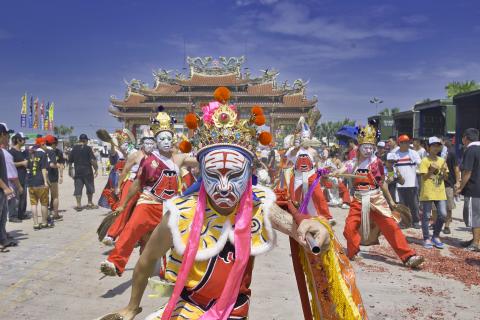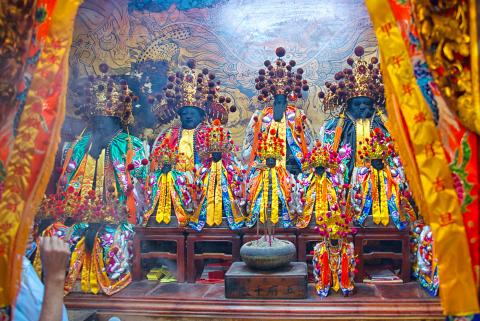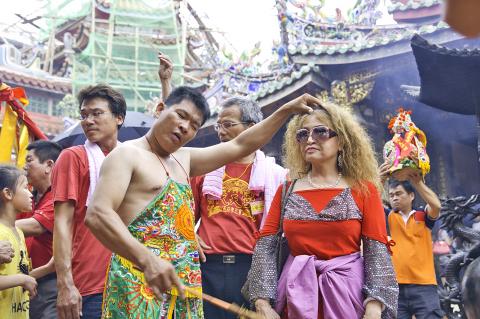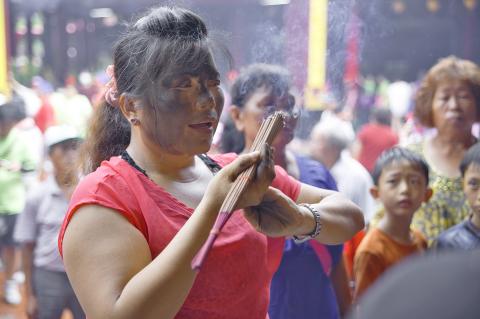The gods need to be entertained — especially if they’ve come from overseas. And the Wangye (Royal Lords), the patron deities of Nankunshen Daitianfu, a sprawling temple complex located in Greater Tainan’s rural Beimen District, know how to throw a good party.
Every year the deities host a birthday bash, when hundreds of temples from throughout Taiwan and Asia descend on Nankunshen Daitianfu — their own gods in tow — to pay respect to the Wangye. These temples, of which Hou Hsian-hsun, the temple’s secretary general, says number over 20,000, do this because they have branched off from Nankunshen, in a process known as “dividing incense” (fenxiang).
A wooden sculpture representing a deity on its own possesses no magical powers and so cannot provide worshippers with protection. However, ritually passing it over the main incense burner of an established temple consecrates the deity, which is then enshrined in a new temple, along with ashes from the senior temple’s incense burner. That new temple then becomes a “branch temple” (fenmiao).

Photo: Noah Buchan, Taipei Times
照片:台北時報記者巴諾亞攝
The branch temple enters into a subordinate relationship, obliging it to return the newly empowered deity, usually carried at the front of a ceremonial troupe, to the source temple on the deity’s birthday to recharge its power — hence the party.
During this temple festival, hundreds of performance troupes (zhentou) — pole dancing women scantily dressed in bikinis, martial shamans ritually flagellating themselves with weapons — entertain the temple’s main deity and all the guests who have come.
Hou says that worshippers are motivated to establish a branch temple of Nankunshen because it is Taiwan’s oldest Wangye temple, a history that began 353 years ago when a ship sailing from China ran aground during a storm off the coast of Beimen.

Photo: Noah Buchan, Taipei Times
照片:台北時報記者巴諾亞攝
Five statues, all avatars of Wangye (folk religion specialists estimate that there are over 100 manifestations of this deity), were retrieved from the wrecked ship and brought to shore. Nankunshen is a rare exception to a general rule that Taiwan’s temples have branched off from temples in China.
Nankunshen isn’t the only temple franchising out as though a 7-Eleven of folk belief. All of Taiwan’s older temples, regardless of their patron deity — Matsu, the Earth God, Baoshengdadi or the Wangye — have branch temples that are expected to send a ceremonial troupe to perform at temple festivals on that particular god’s birthday.
Today, temples large and small, rural and urban have opened their gates to anyone curious enough to show up for a festival, adapting their rituals to changing social and technological trends that appeal to the media, tourists, politicians and government officials, while retaining enough of their traditions to maintain their core believers.

Photo: Noah Buchan, Taipei Times
照片:台北時報記者巴諾亞攝
As a result, temples have become wealthy and powerful.
(Noah Buchan, Taipei Times)
神明應受款待酬謝──尤其是來自海外的神明。王爺──台南北門近郊規模龐大的廟宇「南鯤鯓代天府」所供奉的神明──即深知酬神廟會如何辦好辦滿。

Photo: Noah Buchan, Taipei Times
照片:台北時報記者巴諾亞攝
王爺每年都辦生日趴,台灣及亞洲各地數百座宮廟所供奉的神像齊聚南鯤鯓代天府,以慶祝王爺誕辰。南鯤鯓代天府總幹事侯賢遜說,這是因為那些廟是透過「分香」從南鯤鯓分支出來的,南鯤鯓分香出來的廟超過兩萬座。
代表神明的木刻雕像本身並無神力,無法保佑信眾。但是到香火鼎盛的宮廟中為這尊神像進行過爐儀式(在主香爐上旋繞),神像就會得到神明靈力。這尊神像連同祖廟香爐中的香灰一起迎回,另建新廟供奉,就成了該祖廟的「分廟」。
分香出來的分廟,是從屬於祖廟,分廟的神像必須在神明的誕辰送回祖廟(通常在進香隊伍前面引領),以維續其靈力──這也就是為什麼有上述的生日趴。
在廟會期間,有數百個陣頭──包括比基尼泳裝鋼管舞女郎、用兵器往自己身上擊打的乩童──以饗該廟主祀神及所有來賓。
侯賢遜表示,南鯤鯓代天府是台灣最古老的王爺廟,因此信徒積極由此建立分廟。南鯤鯓代天府的歷史源自三百五十三年前一艘來自中國、因風暴漂流到北門海岸的船。
這艘船上有五尊神像,都是王爺的化身(據民間宗教專家統計,王爺的形象有一百多種),這些神像由擱淺的船內迎出、被帶上岸。台灣的宮廟一般都是由中國的祖廟所分香出來的分廟,而南鯤鯓代天府卻是罕見的例外。
南鯤鯓代天府並非唯一會把民間信仰像7-Eleven加盟展店般分支出去的宮廟。所有台灣較古老的宮廟──無論是媽祖廟、土地公廟、保生大帝廟或王爺廟──都有分廟,而這些分廟都會在神明誕辰派出陣頭回到祖廟參加廟會慶典。
今日的廟宇,無論大小、無論地處鄉間或城市,都敞開大門、歡迎所有想對慶典一探究竟的人;宮廟的儀式也隨著社會與科技的發展而調整,以吸引媒體、遊客、政客與政府官員,同時也保留了足以維繫核心信徒的傳統。
宮廟的財富與影響力也因此變得巨大。
(台北時報林俐凱譯)

Computex, Asia’s biggest electronics conference, kicked off Monday in Taipei, and as in years past drew industry chieftains from Nvidia Corp.’s Jensen Huang and Qualcomm Inc.’s Cristiano Amon to Young Liu of Foxconn, which makes the bulk of the world’s iPhones and Nvidia servers. But while last year’s event was a celebration of the post-ChatGPT AI boom, executives this time are likely grappling with the uncertainty of the Trump administration’s effort to reshape the global trade order — disrupting a decades-old model for tech manufacturing. This year’s exhibition will of course feature the hardware required to bring artificial intelligence to life.

Dog owners often wish they could understand their pets’ thoughts. “Dog buttons” might turn their dream into a reality. These specially designed buttons, __1__ sound chips, enable dogs to communicate their needs by pressing buttons corresponding to pre-recorded words like “walk,” “play,” “outside,” and “food.” This bridges the communication __2__ between humans and their canine companions. The science behind dog buttons is based on the concept of associative learning. It’s a process __3__ learners can link actions with outcomes. For instance, if an owner consistently presses the “walk” button and then takes their dog for a walk, the dog

For many people, allergies are an all-too-familiar annoyance. The constant sneezing, itching, and watery eyes are just a few clear signs of allergies, which is a surprisingly common condition affecting millions worldwide. But what exactly triggers these reactions, and how can we cope with them? Allergies arise from a misunderstanding between our immune system and seemingly harmless substances. Under normal circumstances, the immune system acts as our body’s personal bodyguard, diligently identifying and eliminating threats like viruses and bacteria. However, in individuals with allergies, the immune system mistakenly identifies certain substances, called allergens, as invaders. This triggers a reaction, leading to

1. 眾所皆知,資訊產業是我國經濟的基礎。 ˇ As everyone admits, the IT industry is the backbone of our economy. χ As everyone admits that the IT industry is the backbone of our economy. 註:這裏 as 作關係代名詞,引導從屬子句。誤句多了 that, IT industry is. . . 就變成從屬句,欠缺了主句,結構上錯誤。又如: As my friend pointed out, necessity is the mother of invention. As is known to all, grammar is not the only important thing in language study. 2. 她心情總是非常好。 ˇ She is always in a good mood. χ She always is in a good mood. 註:always, often 一般放在行為動詞之前,連繫動詞、助動詞之後: He always behaves well. He is always happy and gay. He is always reading. 其他用法類似的副詞,還有 still、also、hardly、seldom、never 等。 3. 你看!他還在寫報告呢。 ˇ Look! He is still working